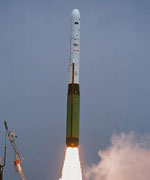
Image credit: Orbital
Orbital Sciences announced on Thursday that they have been given an $11 million contract by the US Air Force to launch a classified satellite payload on a Minotaur rocket. Three other payloads are currently scheduled to launch on Minotaur rockets, which are rebuilt Minuteman ICBMs for the first and second stages, and then the third and fourth stages are from a Pegasus XL rocket. The launch is scheduled for 2005.
Orbital Sciences Corporation (NYSE: ORB) announced today that the U.S. Air Force has exercised an option order for a Minotaur space launch vehicle under the 10-year Orbital/Suborbital Program-2 (OSP-2) contract that was awarded to the company earlier this year. The Minotaur order is the first to be placed under the OSP-2 contract, which is valued at up to $475 million over 10 years on an indefinite delivery/indefinite quantity basis. The new order increases the launch manifest for the Minotaur program to four missions to be carried out over the next two years. This most recent Minotaur space launch vehicle ordered by the Air Force is scheduled to launch a classified payload in 2005. In addition, Orbital is currently under firm contract to carry out three other Minotaur missions, including N-FIRE and XSS-11, both of which are scheduled to be launched in 2004, and COSMIC, scheduled for launch in 2005.
?We are very pleased to have the opportunity to conduct cost-effective military space missions for the Department of Defense,? said Mr. Ron Grabe, Orbital?s Executive Vice President and General Manager of its Launch Systems Group. ?The Minotaur program represents an efficient use of government assets and commercial technology to provide low-cost, operationally responsive and reliable launch services for U.S. government customers.?
Orbital originally developed the four-stage Minotaur rocket under the Air Force’s OSP-1 contract, which was awarded to the company in 1997. The Minotaur vehicle uses government-supplied Minuteman II rocket motors that serve as the vehicle?s first and second stages. The rocket?s third and fourth stages, as well as its guidance and control system, use technology from Orbital’s highly reliable Pegasus XL commercial rocket program.
Orbital has carried out two previous Minotaur missions, both of which were fully successful. In January 2000, Minotaur made its successful debut with the launch of the JAWSAT spacecraft. Later in 2000, the second Minotaur rocket successfully launched the MightySat-II satellite into low-Earth orbit. Both missions were conducted from launch facilities at Vandenberg Air Force Base (VAFB), CA.
Over the past several years, Orbital has experienced rapid growth in its launch vehicle programs for military space and missile defense-related missions. The company?s launch vehicle business is primarily centered at Orbital?s engineering and production facility in Chandler, AZ, where the company employs approximately 800 people. Orbital also maintains launch vehicle assembly, integration and test facilities at VAFB, where the company employs nearly 100 people.
Original Source: Orbital News Release
